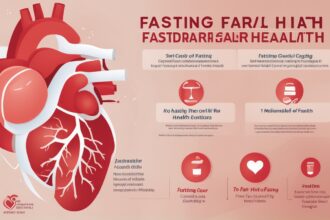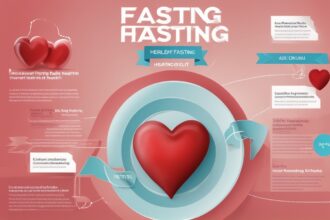Hey there, health enthusiasts! If you’re exploring ways to improve your cardiovascular wellness, you’ve likely stumbled across the buzz surrounding intermittent fasting. But what does fasting have to do with your heart? A lot, actually! The concept of a “fasting heart” – the idea that periodic fasting can positively impact heart health – is gaining traction among researchers and wellness advocates alike. In this deep dive, we’ll unpack how fasting influences heart health, dive into the science behind it, and share actionable tips to integrate fasting into your life for a stronger, healthier ticker. Whether you’re a seasoned faster or just curious about the fasting heart connection, stick around for insights that could transform your approach to wellness.
What Is the Fasting Heart Connection?
Let’s start with the basics. The term “fasting heart” isn’t a medical diagnosis but rather a way to describe the potential cardiovascular benefits of fasting practices like intermittent fasting (IF). Intermittent fasting involves cycling between periods of eating and not eating, with popular methods including the 16/8 approach (fast for 16 hours, eat during an 8-hour window) or the 5:2 plan (eat normally for 5 days, restrict calories on 2 days). Research suggests that these fasting cycles can reduce risk factors for heart disease, such as high blood pressure, cholesterol levels, and inflammation (Malinowski et al., 2019). When done correctly, fasting may act like a reset button for your body, giving your heart a chance to thrive under less metabolic stress. But how exactly does skipping a meal or two benefit your cardiovascular system? Let’s break it down.
The Science Behind Fasting and Heart Health
Now, let’s get into the nitty-gritty of how a fasting heart might just be a healthier heart. When you fast, your body shifts gears. Without incoming calories, it starts tapping into stored energy, like fat, through a process called ketosis. This metabolic switch can lower insulin levels and improve insulin sensitivity, both of which are crucial for preventing heart disease (Patterson & Sears, 2017). Studies also show that fasting can decrease levels of LDL (“bad”) cholesterol and triglycerides while boosting HDL (“good”) cholesterol – a winning combo for your arteries (Tinsley & La Bounty, 2015). Additionally, fasting reduces oxidative stress and inflammation, two sneaky culprits behind cardiovascular issues (Mattson & Wan, 2005). It’s like giving your heart a mini-vacation from the constant workload of processing food. Pretty cool, right?
But wait, there’s more! Fasting may also lower blood pressure by reducing stress hormones like cortisol and improving autonomic nervous system balance (Goldhamer et al., 2002). A study even found that participants practicing alternate-day fasting saw significant drops in blood pressure after just a few weeks (Varady et al., 2013). These findings paint a promising picture for anyone looking to support their fasting heart health naturally. Of course, science isn’t a one-size-fits-all deal, so let’s talk about who can benefit and how to do it safely.
Who Should Consider Fasting for Heart Health?
Not everyone’s body responds to fasting the same way, and that’s okay. If you’re curious about nurturing your fasting heart, it’s worth considering whether this lifestyle tweak fits your needs. Intermittent fasting often works best for individuals with risk factors like high cholesterol, elevated blood sugar, or excess weight – all of which strain the cardiovascular system. Research shows that overweight individuals who adopt fasting protocols can lose visceral fat, the dangerous kind that wraps around organs like the heart, thereby reducing cardiac risk (Catenacci et al., 2016). However, fasting isn’t a magic bullet. If you have a pre-existing heart condition, diabetes, or other chronic illnesses, you’ll want to chat with your doctor before diving in. The goal is to support your heart, not stress it out!
Age and lifestyle also play a role. Younger, active folks might adapt to fasting more easily, while older adults or those with sedentary habits may need a gentler approach. The key is personalization. Start slow, listen to your body, and prioritize heart-friendly fasting practices. Speaking of which, let’s look at some practical ways to get started.
Practical Tips for Supporting Your Fasting Heart
Ready to give fasting a try for your heart’s sake? Awesome! Here are some down-to-earth tips to ensure your fasting heart journey is both effective and sustainable. Remember, this isn’t about starving yourself – it’s about strategic timing and nourishment.
- Start with a Beginner-Friendly Plan: If you’re new to fasting, try the 12/12 method – fast for 12 hours overnight and eat during a 12-hour window. It’s less intimidating and still offers benefits for heart health.
- Stay Hydrated: fasting doesn’t mean skipping water. Drink plenty of fluids during fasting windows to support circulation and prevent dehydration, which can strain your heart.
- Focus on Nutrient-Dense Foods: When you do eat, prioritize heart-healthy foods like avocados, nuts, fatty fish, and leafy greens to maximize cardiovascular benefits.
- Avoid Overeating Post-Fast: Breaking a fast with a huge, heavy meal can spike blood sugar and stress your system. Opt for small, balanced portions instead.
- Monitor Your Body: Pay attention to signs like dizziness or fatigue. If something feels off, pause and reassess with a healthcare provider.
These tips can help ease you into a fasting routine that supports your cardiovascular goals. But fasting isn’t just about when you eat – it’s also about pairing it with other heart-smart habits. Let’s explore that next.
Combining Fasting with Other Heart-Healthy Habits
fasting alone won’t turn you into a heart health superhero. To really optimize your fasting heart benefits, consider weaving in complementary habits. Think of fasting as one piece of a larger wellness puzzle. Here are a few additional practices to amplify your efforts:
- Move Your Body: Pair fasting with moderate exercise like walking or yoga. Physical activity boosts circulation and strengthens your heart muscle.
- Manage Stress: Chronic stress is a silent heart killer. Use fasting windows for mindfulness practices like meditation to calm your mind and lower cortisol levels.
- Get Enough Sleep: Poor sleep messes with heart health by raising blood pressure. Aim for 7–9 hours nightly to let your body recover during fasting cycles.
- Limit Processed Foods: Even on eating days, steer clear of sugary snacks and trans fats. They undo the anti-inflammatory perks of fasting.
By blending fasting with these habits, you create a holistic approach to cardiovascular care. It’s not about perfection – small, consistent changes add up over time. So, take it one step at a time and celebrate every win along the way!
Potential Risks and How to Avoid Them
Before you jump headfirst into fasting for heart health, let’s talk about the flip side. While the fasting heart concept is exciting, it’s not without potential pitfalls. For some, fasting can lead to low energy, irritability, or even irregular heart rhythms if not done mindfully. Those with a history of eating disorders should approach fasting with caution, as it could trigger unhealthy patterns. Additionally, prolonged fasting without proper nutrition might deprive your body of essential nutrients needed for heart function, like potassium and magnesium.
The good news? Most risks can be dodged with a little planning. Work with a healthcare provider to tailor a fasting plan to your unique needs, especially if you’re on medications or have underlying conditions. Don’t push yourself into extreme fasts right off the bat – gradual is the way to go. And always break your fast with balanced meals to avoid blood sugar crashes. By staying informed and proactive, you can reap the rewards of a fasting heart without the drawbacks.
In wrapping up, it’s clear that the fasting heart connection offers a promising path to better cardiovascular health for many of us. From lowering blood pressure to reducing inflammation, intermittent fasting can be a powerful tool when paired with mindful habits and professional guidance. Remember, your heart is the engine of your body – treat it with care by starting slow, staying hydrated, and listening to your body’s signals. Whether you’re aiming to prevent heart issues or simply boost overall wellness, fasting could be a game-changer. So, why not give it a try? Experiment with a simple fasting schedule, track how you feel, and consult your doctor if you’re unsure. Here’s to a stronger, happier heart – one fasting window at a time!
References
- Catenacci, V. A., Pan, Z., Ostendorf, D., Brannon, S., Gozansky, W. S., Mattson, M. P., … & Troy Donahoo, W. (2016). A randomized pilot study comparing zero-calorie alternate-day fasting to daily caloric restriction in adults with obesity. Obesity, 24(9), 1874-1883.
- Goldhamer, A. C., Lisle, D. J., Sultana, P., Anderson, S. V., Parpia, B., Hughes, B., & Campbell, T. C. (2002). Medically supervised water-only fasting in the treatment of borderline hypertension. Journal of Alternative and Complementary Medicine, 8(5), 643-650.
- Malinowski, B., Zalewska, K., Węsierska, A., Sokołowska, M. M., Socha, M. W., Liczner, G., … & Wiciński, M. (2019). Intermittent fasting in cardiovascular disorders—an overview. Nutrients, 11(3), 673.
- Mattson, M. P., & Wan, R. (2005). Beneficial effects of intermittent fasting and caloric restriction on the cardiovascular and cerebrovascular systems. Journal of Nutritional Biochemistry, 16(3), 129-137.
- Annual Review of Nutrition, 37, 371-393.
- Tinsley, G. M., & La Bounty, P. M. (2015). Effects of intermittent fasting on body composition and clinical health markers in humans. Nutrition Reviews, 73(10), 661-674.
- Varady, K. A., Bhutani, S., Klempel, M. C., Kroeger, C. M., Trepanowski, J. F., Haus, J. M., … & Calvo, Y. (2013). Alternate day fasting for weight loss in normal weight and overweight subjects: A randomized controlled trial. Nutrition Journal, 12, 146.






